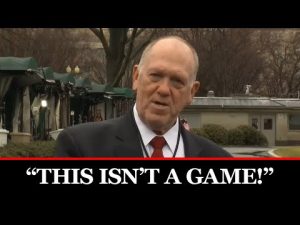**The Great USAID Debate: Unpacking the Funding Tangle**
In recent days, the spotlight has been intensely focused on the United States Agency for International Development, better known as USAID. Often overshadowed by other government agencies, USAID has found itself at the center of controversy as questions arise over the vast amounts of taxpayer funds it receives—funds that some critics claim are poorly allocated and lead to questionable outcomes. This examination is part of the broader “America First” initiative that is urging Americans to rethink the financial commitments of their government and examine whether they truly benefit U.S. interests.
The amount of money flowing through USAID is staggering, with estimates suggesting upwards of $50 billion being spent. This shocking figure has many Americans scratching their heads and wondering what these funds are doing overseas. Allegations have surfaced that some of this money may be funneled into projects that many would deem frivolous. Among these criticisms is the claim that taxpayer dollars are being used to promote agendas, such as funding various LGBTQ programs abroad—sparking debates about whether the U.S. should engage in such international efforts when pressing issues at home remain unaddressed.
The narrative gains even more traction with breaking news involving popular figures like President Trump and Senator Marco Rubio. Reports indicate that 15,000 people connected to USAID are being put on administrative leave, raising eyebrows about the motives behind such a large-scale workforce change. Many suggest it could be a precursor to significant cuts or restructuring at the agency. Critics argue that USAID has become a “deep state slush fund,” used by foreign leaders and organizations without accountability to American citizens.
Rubio, who has stepped into the acting director role at USAID, is pushing for a more aligned foreign policy approach that focuses on U.S. interests first. This could mark a significant shift in how foreign aid is allocated, ensuring that every expenditure serves a clear national purpose. Advocates assert that charitable efforts should be channeled through private charities, like Samaritan’s Purse, rather than a government agency that some perceive as mismanaged and out of touch with its goals.
This pushback against traditional foreign aid practices resonates with an increasing number of Americans who feel that their tax dollars have become an open bank account for foreign nations. As the conversation grows louder, the question remains: How many countries actually provide assistance to the United States? Many regions in America, including places like East Palestine, could certainly use a hand. There’s a resounding sentiment that perhaps it’s time for the U.S. to prioritize its own citizens first before extending a helping hand overseas.
Ultimately, the conversation about USAID serves as a reflection of broader concerns regarding government spending and international involvement. The “America First” philosophy seeks to redirect funds back into American communities, which resonates deeply within the current political climate. As debates continue, it is clear that the agency will remain under scrutiny, and its future may well be shaped by those who demand a return to serving the homeland with unwavering focus. As the drama unfolds, citizens are left wondering what this means for America’s role on the world stage and whether it’s finally time to turn the tide back in favor of its own.



